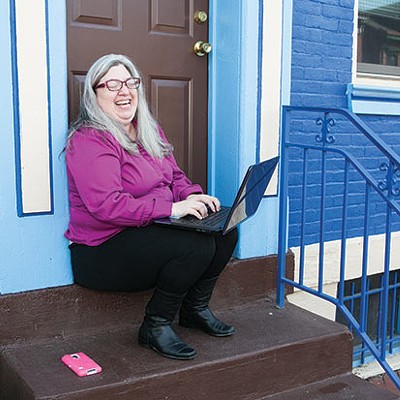They're hunched over laptops, all hugger-mugger, in Voluto Coffee, Penn Avenue, Garfield. It' s well past closing time, but they've paid for the space, the sandwiches and the joe that keeps on coming.
There are a dozen of them, bathed in computer glow, trying to unravel the Gordian knot of web design. Ages 19-50, female and male, they' re here each Tuesday night for three months, taking Saxifrage School' s Web Development 101: Theory and Practice.
For intense instruction, plus Voluto grounds and grub, the fee is $350 — a fraction of what it would be at a traditional college.
"Over the past 40 years," says Timothy Cook, Saxifrage's founder and guiding spirit, "college has become far too expensive. In real dollars, costs have tripled since 1970." He shakes his head. "College must be made affordable. And it also must be financially sustainable without on government subsidies or constant charity.
"This," he gestures around him, "is a start."
"Let's take 10," says design instructor Natalie Robb and her students stand and stretch.
Robb is one of a half-dozen Saxifrage instructors, although the roster fluctuates depending on course offerings. Cook says that when seeking out faculty, he stresses real-world, hands-on experience, more than an academic credential.
"This is the model," he adds, as the students wander about the premises, some ducking outside for a smoke. "We aim to lower the cost of education, in part by utilizing the nomadic campus." Eschewing the desire to acquire real estate, Saxifrage seeks underutilized spaces — off-hour churches and coffee shops, taverns and town halls. Voluto, for example, usually closes at 7 p.m., but tonight' s web design begins at 6:30 and runs for three hours.
"We lower costs," Cook says, "and reconnect with the neighborhood."
Aside from web design, this semester Saxifrage is at the nearby Union Project for carpentry. On the North Side's Community Farm for urban agriculture. And so on.
If it sounds very hands-on, that' s deliberate. "For too long," Cook says, "education disconnected theory and practice. When I graduated W&J six years ago I could read a lot of poetry. I could write a good essay on Transcendentalism. But I couldn' t build anything."
He found virtually everyone he knew in the same situation. "Despite a great expense of time and money," Cook says, "many students were graduating from college with generic degrees that did not prepare them to find work. But for their substantial investment to be worthwhile, students must graduate with hard skills and employable credentials."
Cook is hardly alone with this concern. With college enrollments down, due in no small part to higher prices and less tangible return on investment, many academicians have begun to question not merely the worth of a college degree — but also the role of college itself. With the rise of online learning, and the real inability of many programs to find students in troubled economic times, an idea like Saxifrage might take hold. It' s no coincidence that the program is named after a plant that grows in difficult climates, and whose name in Latin means "stone-breaker."
Setting out to remedy his own situation, Cook signed on as exhibit builder at the Children' s Museum. Working, planning, thinking, he reasoned that with college prices — and student debt — skyrocketing, others would share his interest in low-cost practical coursework. To date, web design, carpentry and farming — all personal interests — have fueled Saxifrage' s growing enrollment. "I began by asking hard questions," Cook recalls, "and coming up with real solutions."
The students straggle back, settling in before their flat screens with Voluto cups in hand.
"They come because they want to learn things," Cook says. "There' s intense interest."
On the business side of the ledger, he' s looking for more partners, more opportunities. "There are 62 churches within a mile of where we are," Cook says, "most of which are empty during the week. Every nonprofit organization has a large meeting or conference space they rarely use. And most of the 20-odd bars are closed until 5 p.m. We could turn a liability — underutilized space — into an asset for our students. And Saxifrage has no plans to operate any student services that should otherwise be provided by local businesses. Instead of a cafeteria and a coffee shop, we will direct students to local eateries and groceries. It's a win-win."
Or it will be if Cook takes his model to his end-game: a full-scale, accredited college program with 50 teachers and 500 students — students who will become job-wielding graduates unburdened by debt.
"We' re starting to work on a sustainable revenue stream," Cook says. "We have all these big ideas."



















